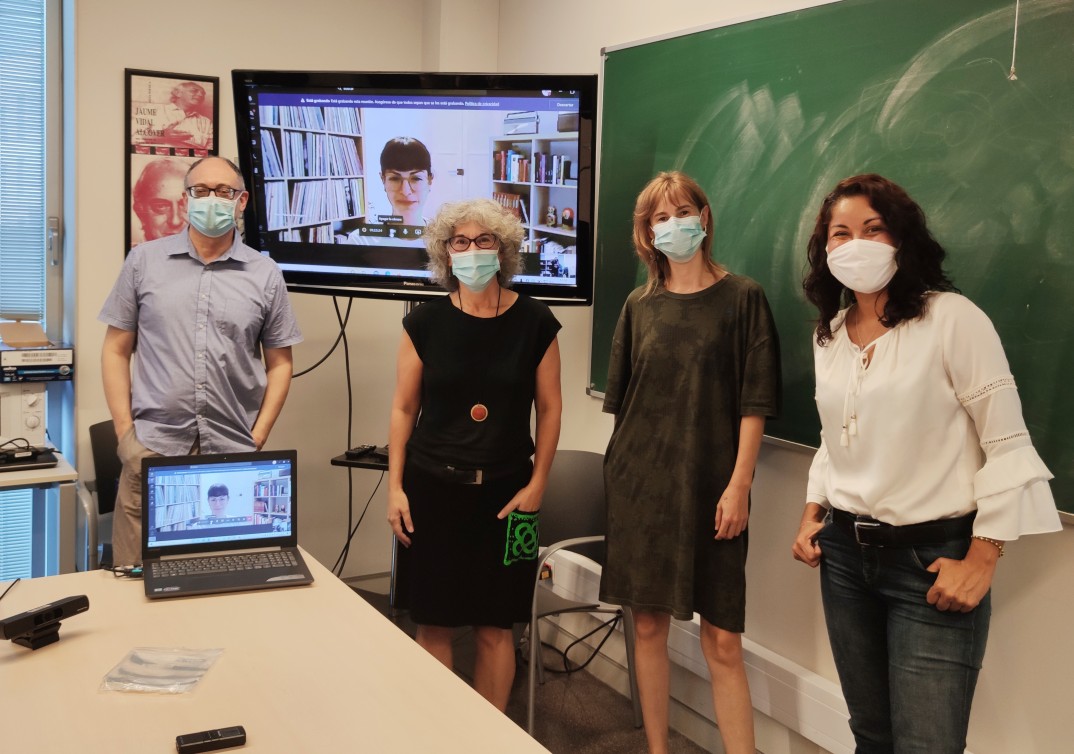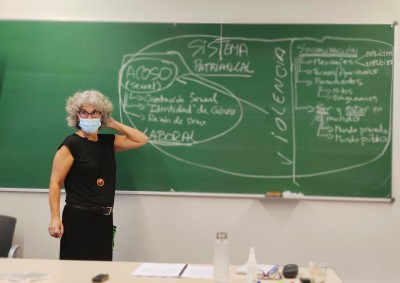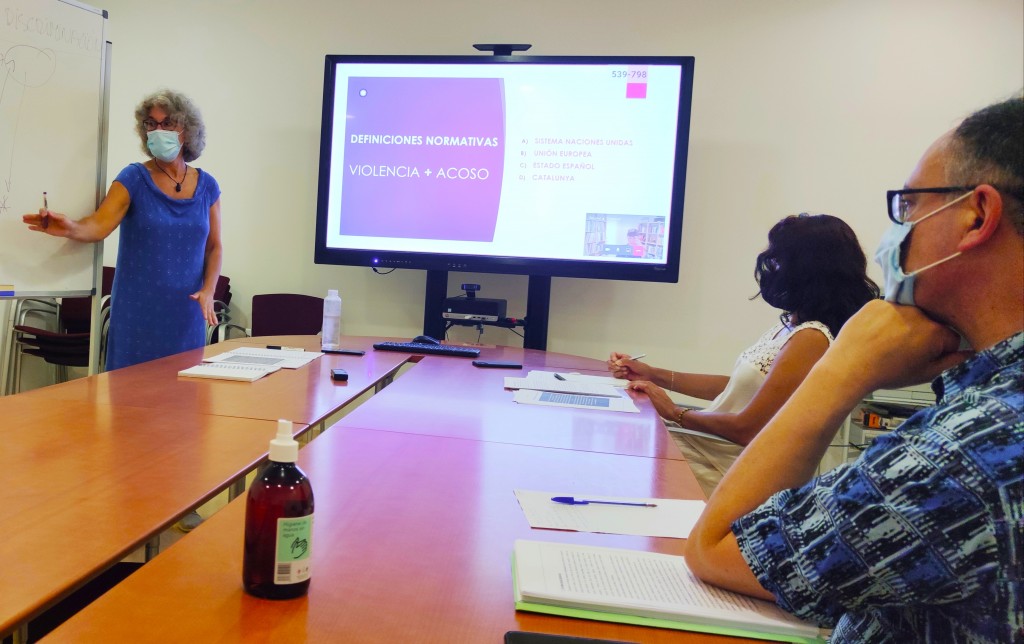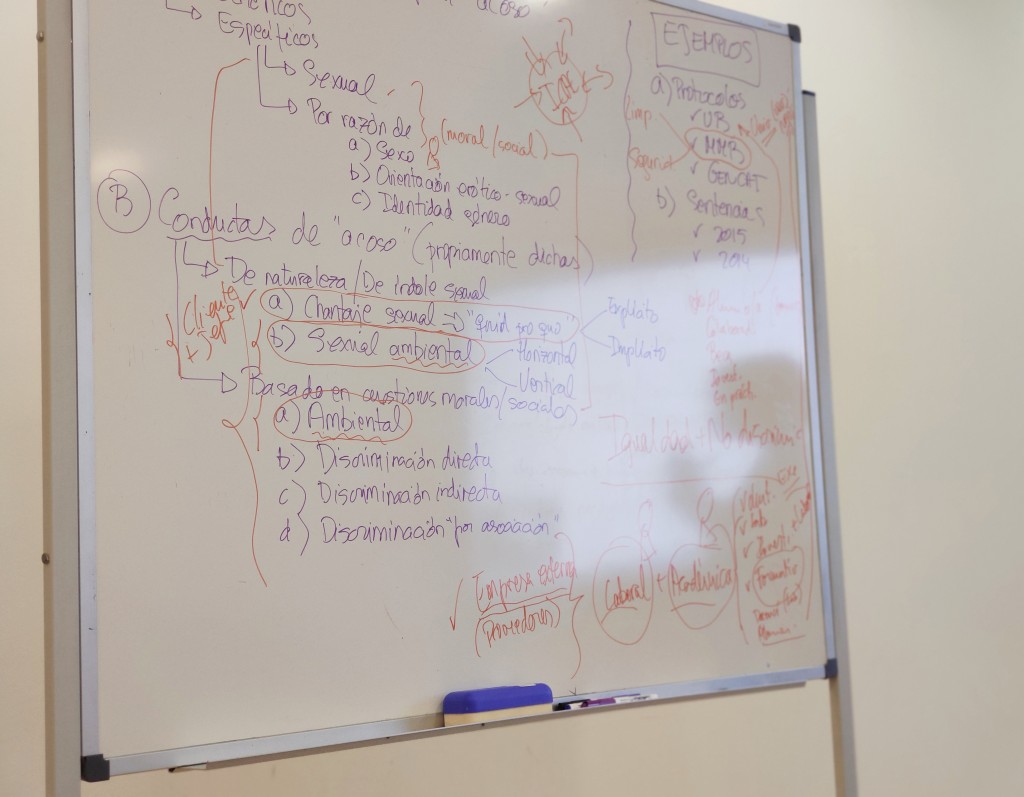

ICAC Equality Committee leads a process for creating a protocol for the prevention, detection, identification and action in situations of sexual harassment at work based on sex, gender or diversity, and other forms of harassment.
This action is included in the ICAC’s Action Plan for Equality (approved by the Board of Directors in 2017) and responds to the ICAC’s will to ensure gender equality and fight against violence and discrimination in both academic and workplace activities.
Thus, it is important to highlight the framework and background of the protocol, which become the starting point of the new initiative that the Institute is now undertaking:
- ICAC’s Action Plan 2014-2020 includes the recommendation of having a comprehensive system of Human Resources Management that includes specific measures and instruments for the care and management of diversity. The promotion of equality policies is an ICAC’s strategic objective.
- Since 2015, ICAC has had the distinction of Excellence in Human Resources promoted by the Human Resources Strategy for Researchers (HRS4R) of the European Commission. The implementation of its Action Plan, which began in 2017, led to the creation of the ICAC Equality Committee, the subsequent approval of the Action Plan for gender equality, and the implementation of the actions and measures included. One of them, the development of a protocol for the prevention, identification and action against violence and workplace harassment, based on sex, gender or diversity.
The protocol has a multipurpose perspective, which includes detection, prevention and definition of actions.
ICAC’s development process of the protocol for the prevention, identification and action against violence and sexual harassment at work has two fundamental dimensions:
- Training dimension. Focused on members of the ICAC’s Equality Committee. But also with the engagement of other people relevant for the process, such as those responsible for human resources management. Thus, the group involved in the training process is diversified and results can be transferred to the entire organization.
Training stage addresses the theoretical understanding of what is harassment, sexual harassment and sexual harassment in the work environment; in addition to other forms of harassment.
Training is not only aimed at obtaining practical resources for the protocol drafting, but also at strengthening the design of the necessary stages after the document is ready: implementation, application and dissemination of the protocol in the workplace.
The protocol is a tool that comes to improve and qualify the work environment.
- Practical dimension: drafting, writing, elaboration and approval of the protocol. The process does not end with the writing of the document, but must be put into practice in the ICAC. Once the protocol is approved, a process of approximately one year will be opened to see how the protocol is implemented, how it acts if it occurs any situation of harassment and, above all, if it can provide useful tools for prevention.
Practical dimension addresses the usage and implementation of the protocol, which wants to stress special emphasis on prevention and the assumption of the new resource by all ICAC community.


Expert support for the training and design process is being led by Elena Apilánez (@elenaap1967), graduated in pedagogy, with a long professional experience linked to international cooperation and a broad academic career focused on the study of the feminist movement.
She is currently developing a doctoral thesis project at the Rovira i Virgili University on the role of the de-patriarchalization in the Bolivian social change. In addition to research, she is professionally dedicated to counselling and training in feminist studies, sexist and patriarchal violence.
The protocol development process has an expected duration of three months, so the document will be ready in December.
The training stage will be developed in four sessions and will include theoretical content on harassment, legal international and national framework, prevention measures or identification of sexist behaviours and attitudes, among other contents.
Further stages will be to advise and design the protocol, from which the ICAC Equality Committee will draft a document proposal and will extend it to the ICAC community.
To achieve a transparent and joined result, some working sessions will be held for the presentation and validation of the protocol within the ICAC community (research staff, research support staff, direction and management, etc.), before submitting the document to the assessment and approval of the ICAC’s Board of Directors.
The protocol is multidimensional: focus and added value are on prevention, to improve the quality and the research and work environment in all the areas where acts the ICAC.


Which particularities face the ICAC in the protocol drafting process? Elena Apilánez highlights the complex institutional character of the Institute since it is a public research centre linked to both the Generalitat de Catalunya and the Rovira i Virgili University (URV), with the participation of Inter-University Council of Catalonia (CIC) and the adhesion to entities such as the CERCA Institution. This complex panorama of institutional references is, in fact, a strength that gives special power and coverage to the protocol.
On the other hand, Apilánez also remarks the diversity of spaces and activities in which acts the ICAC, an issue that can make more complex the design of the protocol: the activity that the ICAC is not limited to a particular physical space, but there are actions carried out outside the workplace itself (archaeological excavations and prospection, conferences…). The physical space multiplies.


Besides, research activity involves the participation of different groups of people (research staff –from different categories and affiliations–, management staff, research support staff, external services…), who at the same time work in different fields of action, such as research, teaching or dissemination.
This complexity must be solved with a clear definition of the action object of the protocol, which is done through the professional bond of the people with the Institute, and with an optimal identification of situations, spaces, behaviours and measures.
ICAC Equality Committee and the Institute’s Direction are very happy to carry out this initiative and hope to obtain the best possible result. The Equality Committee will ensure that the process is transparent and joined by all ICAC community. We will keep you updated!
Members of the ICAC Equality Committee are Jesús Carruesco (URV-ICAC researcher), Lydia Gil (head of the ICAC Library and Documentation Center) and Maura Lerga (head of Communication and Publications at the ICAC). You can find more information here and on the ICAC Equality website.





